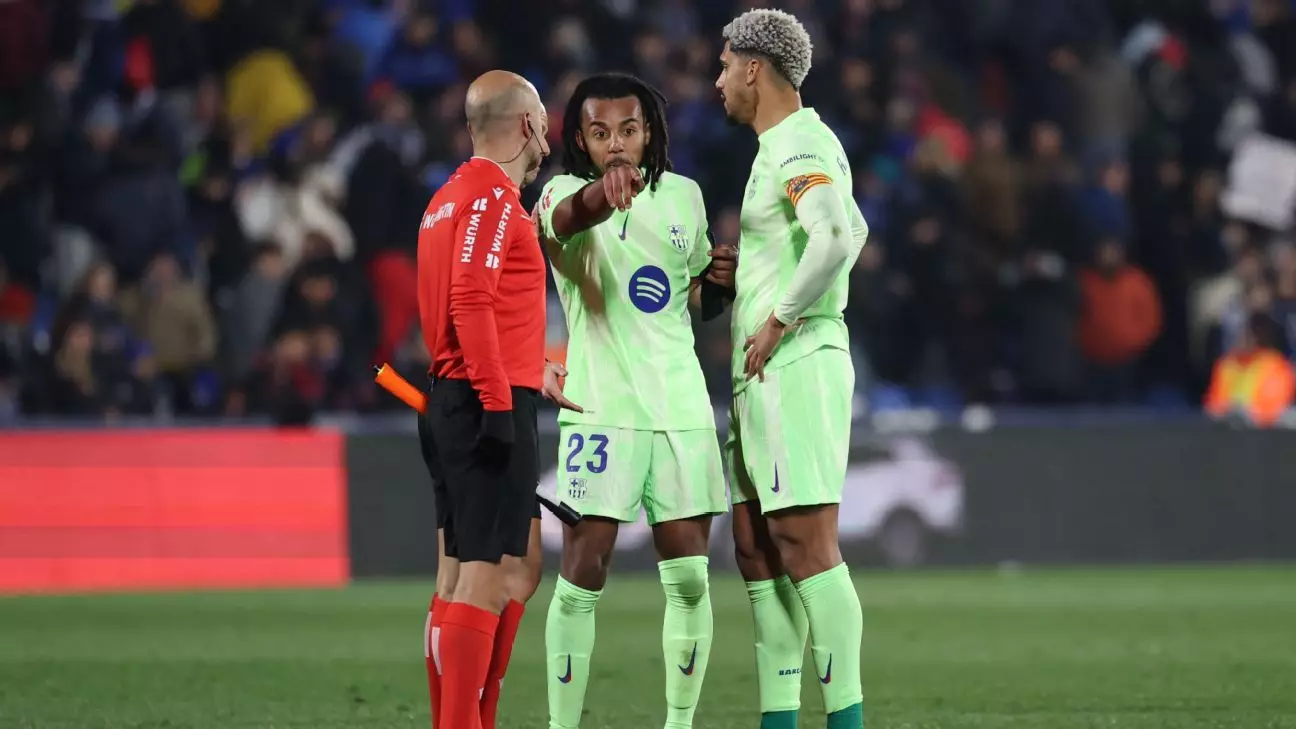Barcelona’s recent La Liga match against Getafe ended in a disappointing 1-1 draw, but it wasn’t the result alone that garnered attention. The focal point of criticism was the decision—or lack thereof—regarding a potential penalty for Barcelona defender Jules Koundé. The incident unfolded during the 81st minute when Koundé was allegedly fouled by Getafe’s Christantus Uche as he attempted to convert a cross. Despite the clear disruption of Koundé’s attempt, both the on-field referee and the Video Assistant Referee (VAR) opted not to award a penalty, resulting in palpable frustration from Barcelona’s camp.
Club president Joan Laporta did not hold back his disappointment when addressing the media. His vehement description of the officiating as “scandalous” signals a deeper frustration not only with the refereeing in this particular match but also possibly with the broader trends in officiating that seem to impact Barcelona disproportionately. The anger is compounded by recalling a similar incident earlier in the season when Real Madrid benefited from a penalty under comparable circumstances. This inconsistency raises concerns about fairness and equity within the league, which can ultimately affect teams’ standings and morale.
Barcelona’s woes in the league starkly contrast their recent successes in cup competitions. Having triumphed in the Spanish Supercopa with a convincing 5-2 victory over arch-rivals Real Madrid, the club’s ability to perform in high-pressure matches raises questions about their league form. However, the cup victories provide a glimmer of hope and may serve as a psychological boost as they prepare for upcoming Champions League fixtures. Their upcoming match against Benfica could be pivotal; a win would ensure progression to the knockout stages, reinforcing their quality and potential on the European stage despite domestic struggles.
Off the pitch, Barcelona is focused on securing the long-term futures of their promising young talents. With players like Pedri and Gavi reportedly close to finalizing new contracts, the club is clearly prioritizing its future strategy by maintaining core young players. The recent renewal of defender Ronald Araújo’s contract reflects this goal, showcasing a commitment to developing a solid foundation for the coming years.
The timeline for Pedri’s contract extension, expected to be announced soon, indicates the club’s proactive approach in managing player contracts amidst potential unrest within the squad. Securing these young stars not only elevates team morale but also positions the club strongly in terms of performance continuity.
Beyond the immediate concerns of officiating and player contracts, Barcelona finds itself in a period of transition. The team’s inconsistency in La Liga, coupled with the promise shown in cup competitions, suggests an underlying struggle to maintain a dominant presence domestically. As they navigate this challenging phase, thoughts of potential player departures—such as that of Eric García—further complicate the club’s landscape.
Barcelona stands at a crucial juncture where performance, officiating controversies, and contract negotiations converge. How effectively they manage these facets may well determine not only their current success in competitions but also the trajectory of the club as it strives to reclaim its former glory.

